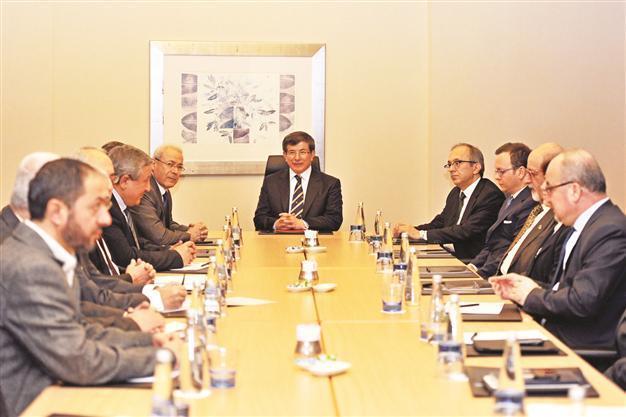Turkey pushes Syria dissidents for unity
ISTANBUL - Hürriyet Daily News

Burhan Ghalioun (L), Chairman of SNC and Turkish Foreign Minister Ahmet Davutoğlu (C) pose before a meeting in Istanbul, on March 2. AFP Photo
Ankara believes a meeting of Syrian dissidents today in Istanbul could become a watershed in the Syrian crisis if the divided opposition can unite to create a common vision for a new government, according to a Turkish official.“If they agree on a document that puts forth a constitutional vision that endorses everybody ahead of the meeting of the Friends of Syria that will take place in Istanbul on April 1, then the Syrian National Council [could be recognized] as the sole legitimate representative of Syrian people,” said the official, who asked to remain anonymous.
At the same time, the official said it would be difficult for the opposition to garner international support if it failed to achieve unity.
The council has convinced the Free Syrian Army to cease behaving like an independent, gang-like group but instead become an entity loyal to the opposition council, the official said while highlighting the need to foster relations between the council and the rebel army. “We have been told that there has been progress between [the council] and the Kurdish National Council,” the official said. The opposition has yet to outline the parameters of a new regime that would replace the rule of Bashar al-Assad, the official said, adding that consensus on a document called the “national contract” could prove to be a turning point in the Syrian crisis.
‘Stability depends on democratic constitution’
“Stability in Syria depends on a democratic constitution that is in conformity with the multicultural fabric of Syria and enables different religious beliefs and ethnic groups to coexist under a constitutional guarantee,” said the official when asked what kind of vision Turkey would like to see in its southern neighbor.
There is a difference in the military capabilities between the opposition and al-Assad’s government, which continues to receive arms from Russia and Iran, even as the international community remains reluctant to even send medical help to the opposition, said the official.
“There are some facts based on Realpolitik, like uncertainties about what will replace the current regime in Syria, the fear of the establishment of an Islamic regime, as well as the concern of securing the Christians’ rights in the country,” the official said. “We are not insistent on a military intervention,” he said, adding that the conditions in the international community had not yet matured enough to insist upon a military intervention.
“We have never talked about a humanitarian corridor. What Prime Minister Recep Tayyip Erdoğan spoke about in reference to a secure zone or a buffer zone is contingency planning,” he said, adding that Article 51 of the U.N. charter gives the right of self-defense to Turkey if it eventually faces a crisis that sends hundreds of thousands spilling over its borders. Turkey and the U.S. share the same view that al-Assad’s regime will be toppled, he said, adding that Erdoğan would warn Iran about its stance of supporting Syria.
















